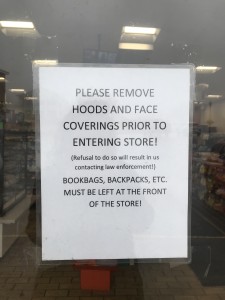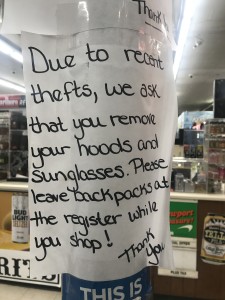“I’m not a lawyer, but this practice raises civil liberties concerns for me”: Policing at FSU
“Guilty before proven innocent?” asks Jamison Odone to his colleagues.
“I’m not a lawyer, but this practice raises civil liberties concerns for me,” says Dr. Eleanor McConnell in response.
“I am equally disturbed by this mass hysteria from faculty and really shocked by this labeling of our students as ‘thieves,’” replies another.
The conversation above occurred between 5:00 and 7:00 p.m. on Monday, March 2, 2020, in an email thread that included all staff and faculty members on Frostburg’s campus. The originating email that began the thread was sent to faculty and staff by Corporal Livingston of the Frostburg State University Police Department (FSUPD). Cpl. Livingston was requesting assistance in identifying a person of interest for a possible theft incident.
The email, sent at 2:23 p.m. included two photographs of an African-American woman. The .jpegs were simply labeled “Theft1” and “theft 2.” The woman appears to be between 18-24 years of age. The original email does not indicate whether the FSUPD believes this person to be a student or not. The photograph was taken in the Appalachian Station at the Lane University Center near the exit to Starbucks.
What ensued from there was a lengthy conversation with at least six faculty members giving differing opinions and suggestions about how this situation could be handled in the future.
One, in response to colleagues that would describe a student as a thief, writes, “It makes faculty (who should know better) appear shallow and insensitive to the plight of students experiencing hunger on our campus.”
McConnell also said, “there is something about this procedure that seems too informal, too diffuse, and too reliant on recognizing young people via stereotyped ‘profiles.’” The email continues to say that the email from Cpl. Livingston and similar ones frequently sent by the FSUPD “implies a kind of guilt even if police are only seeking information– because these screenshots really resemble ‘Wanted’ posters.”
Students were not included in this email chain.
Moreover, a source tells TBL that ten of these emails have been sent by FSUPD requesting assistance in identifying persons of interest in the 2019-2020 school year. Nine of the ten students were people of color.
Coincidentally, earlier in the day, students received an email from Chief Cynthia Smith of the FSUPD requesting that members of the campus community “refrain from reply all on FSUPD requests for information.”
Unbeknownst to students, Senior Corporal Roy R. McKenzie, Jr. had emailed faculty and staff that morning with a second identification request. This email featured a photograph of an African-American male wearing a hoodie. Again, the email went to all staff and faculty soliciting assistance.
In this circumstance, a staff member from housekeeping, Craig Wilhelm, replied all to say, “Should make them take their hoods off inside the food court. Just saying.”
Dr. Kathie Shaffer chimed in to say, “I strongly agree. This is a continuous problem in the classroom where the professor cannot see the student’s face at times and the student can disguise headphones during the lecture.” Shaffer goes on to suggest that a dress policy “would make an equal playing field.”
Within 15 minutes, Dr. Sydney Duncan, Chair of the Department of English wrote, “If an individual professor wants to address attire in the workplace, then the classroom is the place to talk about professional presentation, as many of us do. However, I would be very much against any policy that mandates a dress code for students.”
Cynthia Smith, Chief of the FSUPD says that these email requests “seeking a community’s assistance to identify a person of interest by sharing an image is a basic law enforcement technique.” Furthermore, Chief Smith says that “FSUPD will continue to share images as necessary based on the circumstances of a given investigation.”
The photo-sharing continued with an email from Cpl. Livingston dated Friday, March 6 at 1:14 p.m. This photograph features an African-American male in the Appalachian Station food court.
Dr. Duncan says that these police tactics are part of a larger issue.
“Sending these photographs leads to conclusions,” she says, “I once knew a student who was featured in a circulated photograph and what do you think we talked about all day in the department?”
Moreover, “we don’t know if these people are witnesses or not. So, sending these photographs has two problems. First, there is a presumption of guilt and second, there is an assumption that what someone wears presupposes their behavior.”
Feedback in the email chain did not fall on entirely deaf ears, however.

On Tuesday, March 3, Chief Smith emailed the campus community to say, “the feedback from the campus community articulates the mistaken assumption that the photo adjudicates one guilty. As such, I have directed staff to create .jpeg film names, for images that are to be shared, that do not suggest the nature of the incident being investigated.”
Nonetheless, faculty and staff members have expressed discomfort with being employed to identify persons of interest.
“We are not trained law enforcement officers,” says Duncan, “and it’s not my job to do police work.”
The two separate issues raised over the course of the week, first the sharing of photographs to faculty and staff, and second, a potential dress code policy which would outlaw hoodies on campus have students concerned.

Dakota Whitacre, a junior, told TBL, “I can’t help but think of Trayvon Martin when I think of a young, black male in a hoodie.”
Trayvon Martin was shot and killed by George Zimmerman in 2012. In the 911 call, the Dispatch asked Zimmerman what Martin was wearing. Zimmerman replied, “Yeah. A dark hoodie, like a grey hoodie.”
A no-hoodie policy at Frostburg State University would not be the first dress code limitation within the city. In fact, both 7Eleven and Broadway Beer, Wine & Spirits have posted signs about wearing hoods. The latter sign goes as far as to say that, “due to recent thefts, we ask that you remove your hoods.”
The Frostburg Community Standards do not currently have a restriction on clothing or a stated dress code.
In 2016, Troy Patterson wrote for The New York Times Magazine that “the lingering question of the hoodie is simple: Who enjoys the right to wear one without challenge?”
Now we must ask the same question at Frostburg State University.




